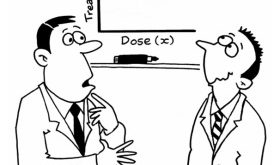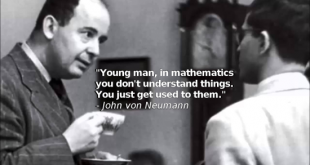Sex and the problem with interventionist definitions of causation We suggest that “causation” is not univocal. There is a counterfactual/interventionist notion of causation—of use when one is designing a public policy to intervene and solve a problem—and an historical, or more exactly, etiological notion—often of use when one is identifying a problem to solve … Consider sex: Susan did not get the job she applied for because the prejudiced employer took her...
Read More »Hunting for causes (wonkish)
Hunting for causes (wonkish) There are three fundamental differences between statistical and causal assumptions. First, statistical assumptions, even untested, are testable in principle, given sufficiently large sample and sufficiently fine measurements. Causal assumptions, in contrast, cannot be verified even in principle, unless one resorts to experimental control. This difference is especially accentuated in Bayesian analysis. Though the priors that...
Read More »John von Neumann on mathematics
John von Neumann on mathematics
Read More »Wissenschaftler irren
.[embedded content]
Read More »Bayesianism — a wrong-headed pseudoscience
Bayesianism — a wrong-headed pseudoscience The occurrence of unknown prior probabilities, that must be stipulated arbitrarily, does not worry the Bayesian anymore than God’s inscrutable designs worry the theologian. Thus Lindley (1976), one of the leaders of the Bayesian school, holds that this difficulty has been ‘grossly exaggerated’. And he adds: ‘I am often asked if the [Bayesian] method gives the right answer: or, more particularly, how do you know if...
Read More »On the poverty of deductivism
On the poverty of deductivism In mainstream macroeconomics, there has for long been an insistence on formalistic (mathematical) modelling, and to some economic methodologists (e.g. Lawson 2015, Syll 2016) this has forced economists to give up on realism and substitute axiomatics for real world relevance. According to the critique, the deductivist orientation has been the main reason behind the difficulty that mainstream economics has had in terms of...
Read More »Realism and antirealism in social science
Realism and antirealism in social science The situation started to change in the 1960s, when antirealism wenton the rampage in the social studies community as well as in Anglo-American philosophy. This movement seems to have had two sources, one philosophical, the other political. The former was a reaction against positivism, which was (mistakenly but conveniently) presented as objectivist simply because it shunned mental states. I submit that the...
Read More »Dialektik der Aufklärung
.[embedded content]
Read More »Bayesianism — a scientific cul-de-sac
Bayesianism — a scientific cul-de-sac The bias toward the superficial and the response to extraneous influences on research are both examples of real harm done in contemporary social science by a roughly Bayesian paradigm of statistical inference as the epitome of empirical argument. For instance the dominant attitude toward the sources of black-white differential in United States unemployment rates (routinely the rates are in a two to one ratio) is...
Read More »Bayesianism — a patently absurd approach to science
Bayesianism — a patently absurd approach to science Mainstream economics nowadays usually assumes that agents that have to make choices under conditions of uncertainty behave according to Bayesian rules (preferably the ones axiomatised by Ramsey (1931), de Finetti (1937) or Savage (1954)) — that is, they maximise expected utility with respect to some subjective probability measure that is continually updated according to Bayes theorem. If not, they are...
Read More » Heterodox
Heterodox







